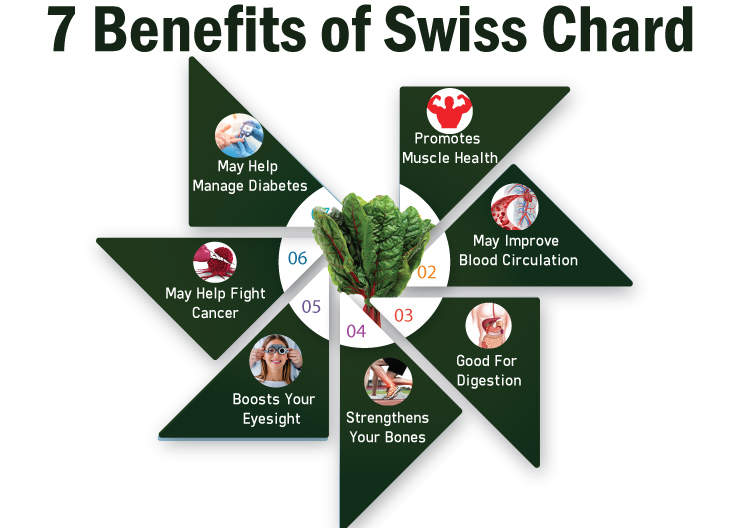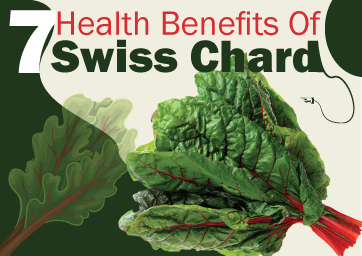What is Swiss Chard?
Swiss chard vegetables are leafy greens related to beet, kale, collards, mustard greens, turnip greens, and Spinach. It grows mainly in the hills where the weather is cool and humid. Its bright-green leaves have a mild flavor similar to Spinach.
Varieties of Swiss Chard
There are three main types of chard: red, white, and rainbow. Each type has its unique characteristics. Red chards have deep crimson-colored leaves and stems. White chards have pale green to white stems and leaves. Rainbow chards have both red and yellow leaves. You can eat these greens raw or cooked, steamed, sauteed, or pickled.
● Red Chard
This variety of chard has thick stalks that range from 4 to 6 inches long. Use them in salads, soups, or stews when cooking. It has a more peppery flavor and is often grown in the fall and winter.
● White Chard
This variety has thin stalks that range from 5 to 8 inches long. The leaves have a fresh, sweet taste. Use them in salads, soufflés, or pasta dishes.
● Rainbow Chard
This variety has red and yellow leaves, making it a beautiful addition to any dish. Its leaves are similar to those of red chards. However, the stems are much thinner. While Rainbow Chard nutrition is an excellent reason to add it to your plate, the leaves can also be used for garnishing and making dishes more appealing.
Swiss Chard Nutrition
One cup of chopped Swiss chard (roughly 36-gram) provides you with 7 calories, 0.65 grams of protein, 0.07 grams of fat, 1.35 g of carbohydrate, including 0.6 g of fiber, and 0.4 g of sugar.
Swiss chard is high in dietary fiber and low in calories. It alone meets all your daily recommended intake of vitamin A. It also contains vitamin C and K, both vital for supporting your immune system and helping reduce your risk of various diseases. For more details on swiss chard nutrition and calories, visit this link.
By The Way, It's also Versatile!
Swiss chard is one of the most versatile greens you can eat. You can use it in soups, stews, salads, and even sandwiches. It goes well with eggs, other greens, and beans, so it's a great addition to any vegetarian meal. Swiss chard can also be eaten as a side dish or a topping on pizza or pasta, making it an excellent way to boost the nutritional value of your favorite foods.
You can cook Swiss chard just like any other green vegetable. You can sautee, steam, boil, or even microwave it. The best way to prepare Swiss chard is to cut it into bite-sized pieces and then add it to soups, salads, stir-fries, pasta dishes, casseroles, and stews.
7 Benefits of Swiss Chard
So, are you prepared to increase your intake of Swiss chard? If you haven't already, we are sure the following list of chard health benefits will convince you to start.

1. May Help Manage Diabetes
Swiss chard is rich in two types of dietary fiber—soluble and insoluble. Both types are essential for a healthy digestive system, but only soluble fiber has the bonus of regulating blood sugar. Soluble fiber binds to carbohydrates in your digestive system and changes them into a form your body can't break down and use as energy. This means that the carbohydrates don't get absorbed into your bloodstream, which helps reduce the risk of diabetes.
2. May Help Fight Cancer
Swiss chard is particularly rich in antioxidants, which can help fight the development of cancerous cells. It's also full of beneficial minerals like selenium, which has been shown to reduce the risk of certain types of cancer in the lab. Although more research is needed to figure out the exact mechanisms at work, we know that selenium can help repair DNA damage, reduce free radical damage, and support the immune system.
3. Boosts Your Eyesight
Healthy eyesight depends on vitamin A. Your immune system and skin care depend on it as well. One of the best sources of vitamin A is Swiss chard. They contain up to 20 times more vitamin A than lettuce, Spinach, or carrots. So don't think twice and include chard vegetables in your diet.
4. Strengthens Your Bones
Calcium is essential for bone health. Eating Swiss chard vegetables can help meet your recommended calcium intake, reducing the risk of osteoporosis. Calcium, vitamins K and B6, and other nutrients essential for strong bones can all be found in Swiss chard. Vitamin B6 is required to transform calcium into a form your body can use, and vitamin K aids in controlling calcium levels in the body.
5. Good For Digestion
The high levels of dietary fiber in Swiss chard can help prevent digestive issues like constipation, diarrhea, and irritable bowel syndrome (IBS). Swiss chard contains both insoluble and soluble fiber, which can help balance your gut bacteria and regulate your bowel movements. Additionally, it can make you feel full after eating, which can help you control your portions and lose weight.
6. Promotes Muscle Health
Swiss chard is rich in iron, crucial for making hemoglobin, the protein that transports oxygen around your body. Iron deficiency can cause a wide range of problems. And while many people are aware that they need to boost their iron intake, they don't always know how to do it. Eating Swiss chard can be an excellent way to increase your iron intake, especially if you're a vegetarian or vegan.
7. May Improve Blood Circulation
One cup of cooked Swiss Chard provides 6 percent of your daily iron requirements. Iron deficiency can lead to an increased risk of anemia, causing fatigue and poor concentration. Swiss chard also promotes the production of healthy red blood cells that carry oxygen throughout the body.
Risk and Allergies of Swiss Chard
Swiss chard is highly nutritious, like many other leafy greens, but it does contain oxalic acid, a minor toxin that could cause some individuals to experience digestive problems.
If you experience bloating, pain, or other digestive issues after eating Swiss chard, you may have an intolerance or allergy to oxalic acid. You should avoid eating Swiss chard in the future.
Swiss chard contains oxalic acid, which might be troublesome for those who have kidney stones. Ask your doctor if Swiss chard is safe for you to eat if you have similar worries.
Finally, Swiss chard is often grown in fields that are also used to grow wheat, soybeans, and other types of grain. It's impossible to eliminate the risk of cross-contamination, so checking for allergies when eating this type of food is essential.
Tips to Buy the Best Swiss Chard
To ensure you're getting the best quality chard you can buy, look for the following qualities:
• Freshly picked - If you notice that the chard looks wilted, bruised, or damaged, don't purchase it. You want fresh produce that hasn't been sitting around for long.
• Firm - Look for a chard that doesn't feel squishy or soft. Firm chard should feel sturdy enough to cut without breaking. If you have doubts about whether or not it's firm, squeeze it - if it feels hard, it's probably okay.
• Bright green - When shopping for chard, look for a fresh emerald-green color. The chard is probably picked early if it is pale green or brownish; hence not as nutritious as you would prefer.
• Clean - Ensure the leaves aren't covered in dirt, insects, or debris. Even tiny particles can cause the chard to lose nutrients and become bitter.
Key Takeaways
If you are bored and tired of regular Spinach and need an equally healthier option, try Swiss Chard. You won't regret it. It tastes delicious and is packed full of nutrition!
● It helps lower cholesterol.
● It is excellent for heart health.
● Contains a lot of iron and folate
● Has a lot of vitamin K
● It is loaded with fiber and is low in calories
So next time you buy groceries, add some Swiss Chards to your veg basket; you will be doing your body and mind a great favor.



 Contact Us
Contact Us

 Hospitals
Hospitals
 Doctors
Doctors
 Diagnostic
Diagnostic
 Pharmacy
Pharmacy
 Health Tips
Health Tips
 Blog
Blog


















Comments